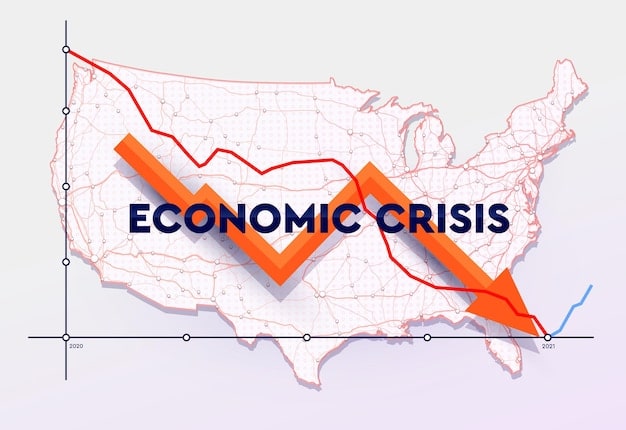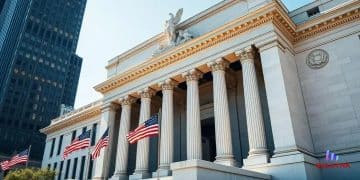National Debt Alert: Investments at Risk with 130% GDP Projection

Alert: The National Debt is Projected to Reach 130% of GDP by 2025 – How Will This Affect Your Investments? This projection signifies a substantial economic challenge for the U.S., potentially leading to increased interest rates, inflation, and market volatility, all impacting investment strategies and returns.
The U.S. national debt is climbing, and projections indicate it could reach a staggering 130% of GDP by 2025. This raises serious concerns about the stability of the economy and how it will impact your investments. Understanding the implications of this rising debt is crucial for navigating the financial landscape and protecting your financial future. Alert: The National Debt is Projected to Reach 130% of GDP by 2025 – How Will This Affect Your Investments? is a question every investor in the United States needs to be asking right now.
Understanding the U.S. National Debt and GDP
Before diving into the potential effects, it’s important to understand what the national debt and GDP are and how they relate to each other. This foundational knowledge will provide context for the discussions to come.
What is the National Debt?
The national debt is the total amount of money that the U.S. federal government owes to its creditors. This includes debt held by the public (like Treasury bonds) and debt held by government accounts.
What is GDP?
GDP, or Gross Domestic Product, represents the total value of goods and services produced in a country during a specific period, usually a year. It’s a key indicator of a country’s economic health.
The Debt-to-GDP Ratio
The debt-to-GDP ratio is calculated by dividing a country’s national debt by its GDP. This ratio provides a more meaningful picture of a country’s debt burden relative to its economic output. A higher ratio indicates a higher level of debt compared to the country’s ability to generate income.
- A high debt-to-GDP ratio can signal potential economic instability.
- It can lead to concerns about a country’s ability to repay its debts.
- Investors often view a high ratio with caution, potentially impacting investment decisions.
Understanding these concepts is crucial for assessing the potential impact of a rising national debt on your investments. Now, let’s explore the specific ways this debt could affect your portfolio.

Potential Economic Consequences of a 130% Debt-to-GDP Ratio
A national debt reaching 130% of GDP is not just a number; it can trigger a series of economic consequences that ripple through the financial system. Here’s a breakdown of some of the most significant potential impacts.
Increased Interest Rates
As the government borrows more money to finance its debt, it can put upward pressure on interest rates. This is because increased borrowing can lead to higher demand for credit, driving up the cost of borrowing.
Inflationary Pressures
Large government spending, often funded by borrowing, can contribute to inflation. If the government injects too much money into the economy, it can lead to an increase in the general price level.
Slower Economic Growth
High levels of debt can hinder economic growth. A significant portion of the government’s revenue may need to be allocated to debt servicing, leaving less available for investments in areas like infrastructure, education, and research and development.
- Rising interest rates can increase borrowing costs for businesses, potentially slowing down investment and expansion.
- Inflation can erode consumer purchasing power, leading to reduced spending.
- Reduced government investment can limit long-term economic potential.
These economic consequences can significantly affect the investment landscape, creating both challenges and opportunities for investors. Let’s explore how these consequences might specifically impact your investments.
Impact on Different Investment Types
The projected national debt level can have varied effects on different types of investments. Understanding these nuances is crucial for making informed decisions about your portfolio allocation.
Stocks
Stocks can be volatile in an environment of high national debt. Concerns about economic growth and rising interest rates can lead to market downturns. However, certain sectors, like those benefiting from government spending, might perform well.
Bonds
The bond market can also be affected. Rising interest rates can decrease the value of existing bonds. Investors may demand higher yields to compensate for the increased risk of government debt.
Real Estate
The real estate market can be sensitive to interest rate changes. Higher mortgage rates can make it more expensive for people to buy homes, potentially leading to a slowdown in the housing market.
On the other hand, rising inflation can increase the value of real assets like real estate, providing a hedge against inflation. The impact on real estate will depend on the interplay of these factors.
- Diversification can help mitigate the risks associated with any single asset class.
- Consider investing in sectors that are resilient to economic downturns.
- Stay informed about market trends and adjust your portfolio accordingly.
By understanding the potential impact on different asset classes, you can make more informed decisions about your investment strategy.

Strategies to Protect Your Investments
While a high national debt can create uncertainty, there are several strategies you can employ to protect your investments and potentially even capitalize on the changing economic environment.
Diversification
Diversifying your portfolio across different asset classes, sectors, and geographic regions is a fundamental risk management strategy. It reduces your exposure to any single investment and can help cushion the impact of market volatility.
Inflation Hedges
Consider investing in assets that tend to perform well during periods of inflation. These can include commodities, real estate, and Treasury Inflation-Protected Securities (TIPS).
Focus on Value
Value investing involves identifying companies that are undervalued by the market. These companies often have strong fundamentals and can be more resilient during economic downturns.
It’s important to remember that past performance is not indicative of future results. No investment strategy can guarantee profits or protect against losses. Consult a financial advisor to determine the strategies that are best suited to your individual circumstances.
- Regularly review and rebalance your portfolio to maintain your desired asset allocation.
- Consider incorporating international investments to diversify your geographic exposure.
- Stay disciplined and avoid making emotional investment decisions based on short-term market fluctuations.
Taking a proactive approach to managing your investments can help you navigate the challenges posed by a high national debt and position yourself for long-term success.
The Role of Government Policies
Government policies play a critical role in shaping the economic landscape and influencing the impact of the national debt. Understanding these policies is essential for assessing the potential risks and opportunities for investors.
Fiscal Policy
Fiscal policy refers to the government’s use of spending and taxation to influence the economy. Decisions about government spending, tax rates, and budget deficits can have a significant impact on the national debt and the overall economic outlook.
Monetary Policy
Monetary policy, primarily controlled by the Federal Reserve, involves managing the money supply and interest rates to promote economic stability and growth. The Fed’s actions can influence inflation, employment, and borrowing costs.
Regulatory Policies
Regulatory policies, which govern various aspects of the economy, can also have a significant impact on investment outcomes. Changes in regulations related to finance, energy, and healthcare, among others, can affect the profitability of different industries and sectors.
The government’s response to the rising national debt will be a key factor in determining its ultimate impact on the economy and the investment environment. Monitoring policy changes can provide valuable insights for investors seeking to navigate the challenges ahead.
- Follow news and analysis from reputable sources to stay informed about government policy developments.
- Consider how policy changes might affect different sectors of the economy and your investment portfolio.
- Engage with policymakers and advocate for policies that promote long-term economic stability and growth.
Staying informed and engaged can help you better understand the complex interplay between government policies and investment outcomes.
Seeking Professional Advice
Navigating the complexities of a high national debt environment can be challenging, especially for individuals who are not financial experts. Seeking professional advice from a qualified financial advisor can provide valuable guidance and support.
Benefits of Working with a Financial Advisor
A financial advisor can help you assess your risk tolerance, set financial goals, and develop a personalized investment strategy that is tailored to your individual needs and circumstances. They can also provide ongoing support and guidance as your financial situation evolves.
Choosing the Right Advisor
When selecting a financial advisor, it’s important to consider their qualifications, experience, and fee structure. Look for advisors who are certified financial planners (CFPs) or have other relevant credentials. Ask about their investment philosophy and how they manage risk.
The Value of Objective Guidance
A good financial advisor will provide objective guidance and help you make informed decisions based on your best interests. They can help you avoid emotional investment decisions and stay focused on your long-term goals.
While the cost of financial advice can be a concern for some investors, the potential benefits of working with a qualified advisor can often outweigh the costs. A financial advisor can help you protect your investments, achieve your financial goals, and navigate the challenges of a complex economic environment.
- Ask potential advisors for references from other clients.
- Make sure you understand the advisor’s fee structure and how they are compensated.
- Choose an advisor who is transparent and communicates clearly about their investment recommendations.
Seeking professional advice can be a valuable investment in your financial future. It can provide you with the knowledge, support, and guidance you need to navigate the challenges of a complex economic environment and achieve your long-term financial goals. By understanding the potential effects of the national debt on your investments and taking proactive steps to protect your portfolio, you can mitigate the risks and position yourself for long-term success.
| Key Aspect | Brief Description |
|---|---|
| ⚠️ Debt-to-GDP Ratio | Projected to reach 130% by 2025, signaling economic challenges. |
| 📈 Interest Rates | Likely to increase due to higher government borrowing. |
| 🛡️ Investment Strategies | Consider diversification, inflation hedges, and value investing. |
| 🧑💼 Professional Advice | Seek guidance from a financial advisor for personalized strategies. |
Frequently Asked Questions
▼
A 130% debt-to-GDP ratio indicates a high level of national debt relative to the country’s economic output, potentially signaling economic instability and challenges in repaying debts.
▼
Increased interest rates can decrease the value of existing bonds and raise borrowing costs for businesses, potentially leading to slower economic growth and market volatility.
▼
Consider investing in assets that tend to perform well during inflationary periods, such as commodities, real estate, and Treasury Inflation-Protected Securities (TIPS).
▼
Government fiscal, monetary, and regulatory policies can significantly impact the national debt and the overall economic outlook, influencing investment risk and opportunity.
▼
A financial advisor can provide personalized guidance, assess your risk tolerance, and develop an investment strategy tailored to your needs, helping you navigate complex economic environments.
Conclusion
In conclusion, the projected rise in the national debt to 130% of GDP by 2025 presents potential challenges for investors which investors need to be aware of. By understanding the potential economic consequences, implementing appropriate investment strategies, and staying informed about government policies, investors can mitigate the risks and position themselves for long-term financial success. Seeking professional financial advice can provide you with the knowledge, support, and guidance you need to navigate the challenges of a complex economic environment and achieve your long-term financial goals.





